Faculty of Engineering
eng.mcmaster.ca
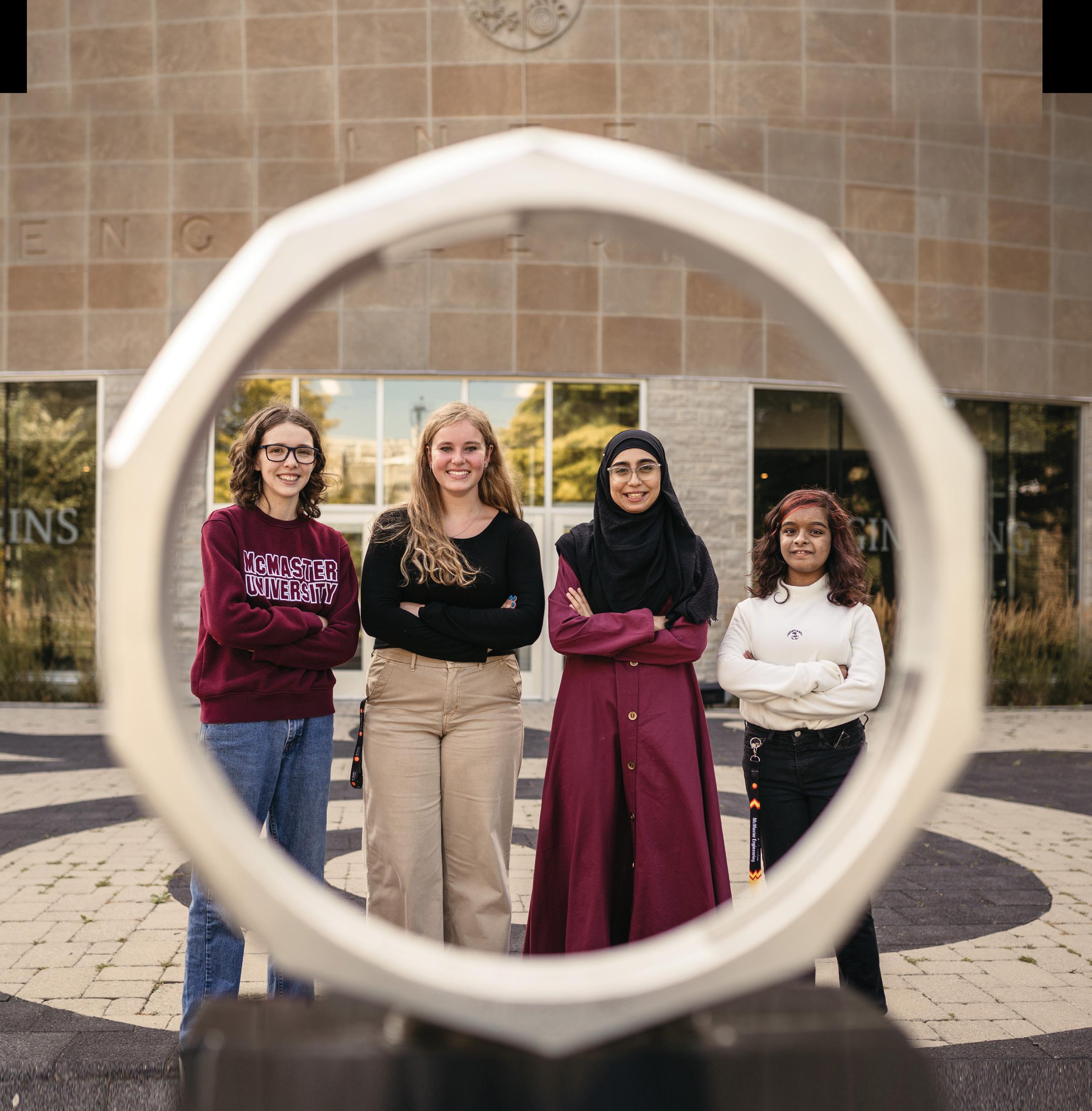
2022 ANNUAL REPORT
In 2022, we came back home. Our labs, studios and lecture halls were once again filled with that special energy only found in McMaster’s Faculty of Engineering. We’re all familiar with the shared passion for discovery, learning and development that radiates from everyone in our Fireball Family community.
Naturally, returning to a fully in-person experience meant more opportunities for meaningful engagement, collaboration and impact.
In this report, we’ve highlighted achievements and stories from the past year that align with four key priorities: inclusive excellence; teaching and learning; research and scholarship; and engaging local, national, Indigenous and global communities.
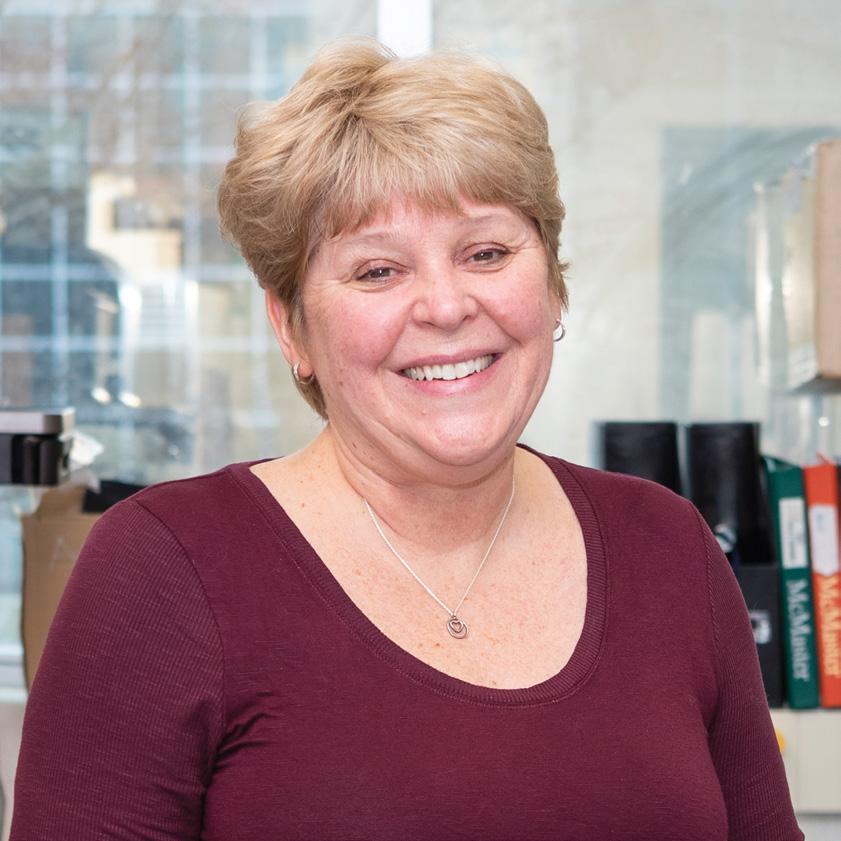
Within these pages, you’ll meet the four students who grace the front cover. These remarkable young leaders also happen to be part of the 40 per cent of first-year undergraduate engineering students who are women, a new equity milestone for the Faculty.
Before setting foot in a classroom, Chelsey Ellis, Javayria Mudassar, Neaha Bijo and Julia Dowson already had diverse engineering interests and experiences, which is a testament to our broad outreach efforts. One of our goals is to show young women how they can make a difference in this world through engineering.
This past year, we also witnessed the impact of The Pivot, our transformed engineering curriculum, as well as our outstanding suite of experiential learning opportunities. The latter includes co-op, Canada’s largest undergraduate research program, co-curricular activities and clubs and teams.
What’s more, for the second year in a row, McMaster Engineering graduates won the National James Dyson Award, with another Mac Eng grad receiving the James Dyson Global Sustainability Award.
We were also incredibly proud to bring new and exciting learning opportunities to Indigenous communities. Make sure to read our story on a pilot project for a unique micro-credential course, where students from Six Nations Polytechnic participated in a land-based experiential learning approach to science and engineering.
Finally, the partnership between McMaster and Cubic Corporation’s Cubic Transportation Systems (CTS) is just one example of how we’re actively tackling global issues through our research. We’re thrilled to share how this new program will help design the future of inclusive mobility, while also training the next generation of engineers, scientists and leaders.
We hope you enjoy reading this report as much as we enjoyed creating it. As always, while there are certainly a number of milestones worth celebrating from the past year, we also can’t wait to see what comes next.
Sheardown Dean, Faculty of Engineering

2 Faculty of Engineering | Annual Report 2022 McMaster Engineering BRIGHTER WORLD 3
TABLE OF CONTENTS 05 About McMaster University 06 About McMaster Engineering 16 Inclusive Excellence 24 Teaching and Learning 34 Research and Scholarship Engaging Local, National, Indigenous and Global Communities 44 42 Innovation with Impact 52 Leadership, Awards & Appointments 08 Program Overview 10 McMaster Engineering: By the Numbers
Heather
Message
from
Dean Heather Sheardown
About McMaster




Founded in 1887, McMaster University is one of the top 85 universities in the world. As global leaders in research and innovation, our community of students, faculty, staff and alumni put our problem-based learning model into action through our collective devotion to advance human
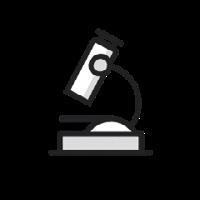
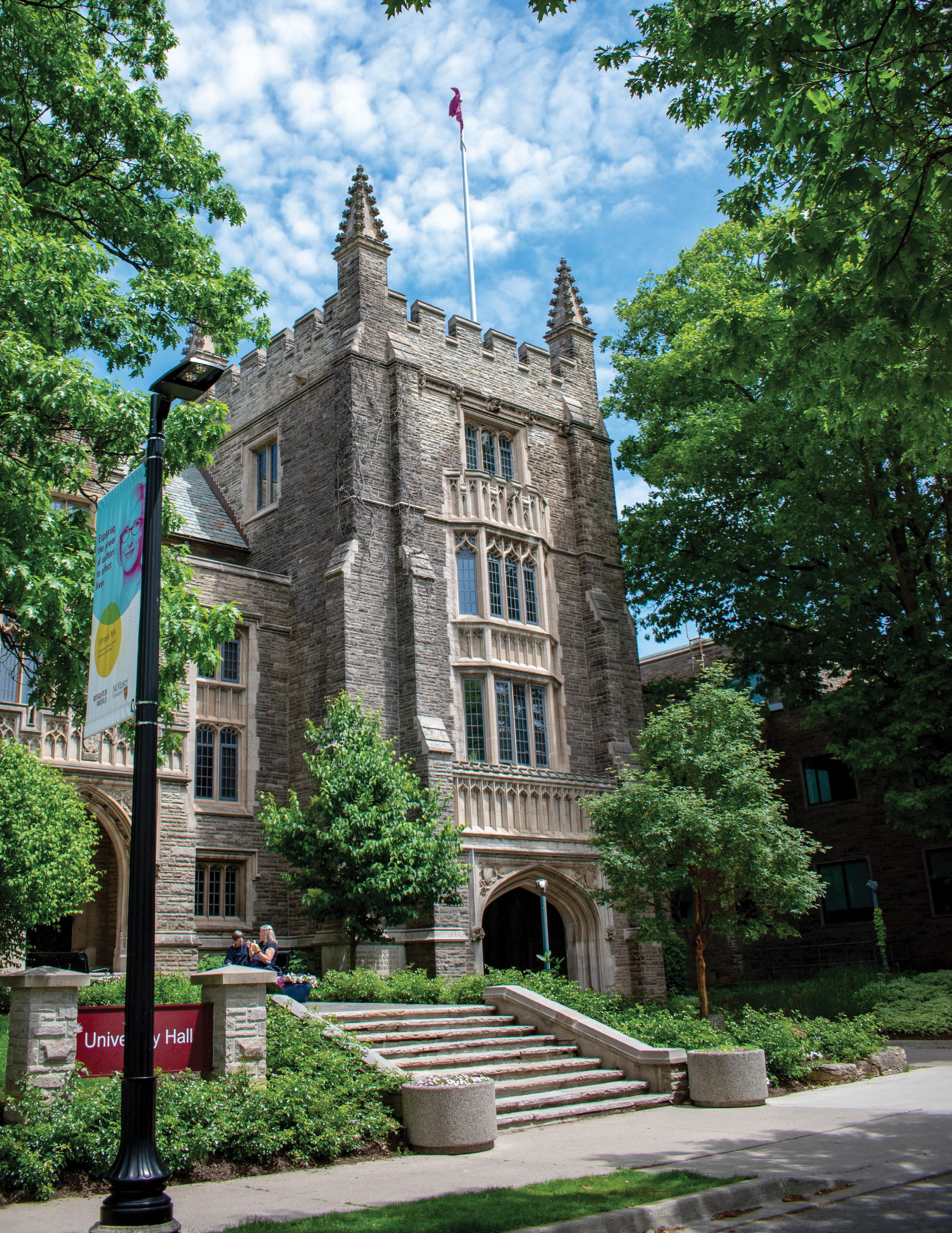
and societal health and well-being. Located in the heart of Hamilton, Ontario, Canada, our campus is home to state-ofthe-art research facilities, institutes, labs and classrooms where we push the limits of what’s possible every single day, committed to creating a brighter world for all.

McMaster Engineering BRIGHTER WORLD 5
Home to more than 37,000 students #6 in the world for good health and well-being (Times Higher Education Impact Rankings 2022) Ranked among Canada’s most research-intensive universities (Research Infosource 2021) #37 in the world for global impact (Times Higher Education Impact Rankings 2022) Over 213,000 alumni More than 70 research centres and institutes
About McMaster Engineering
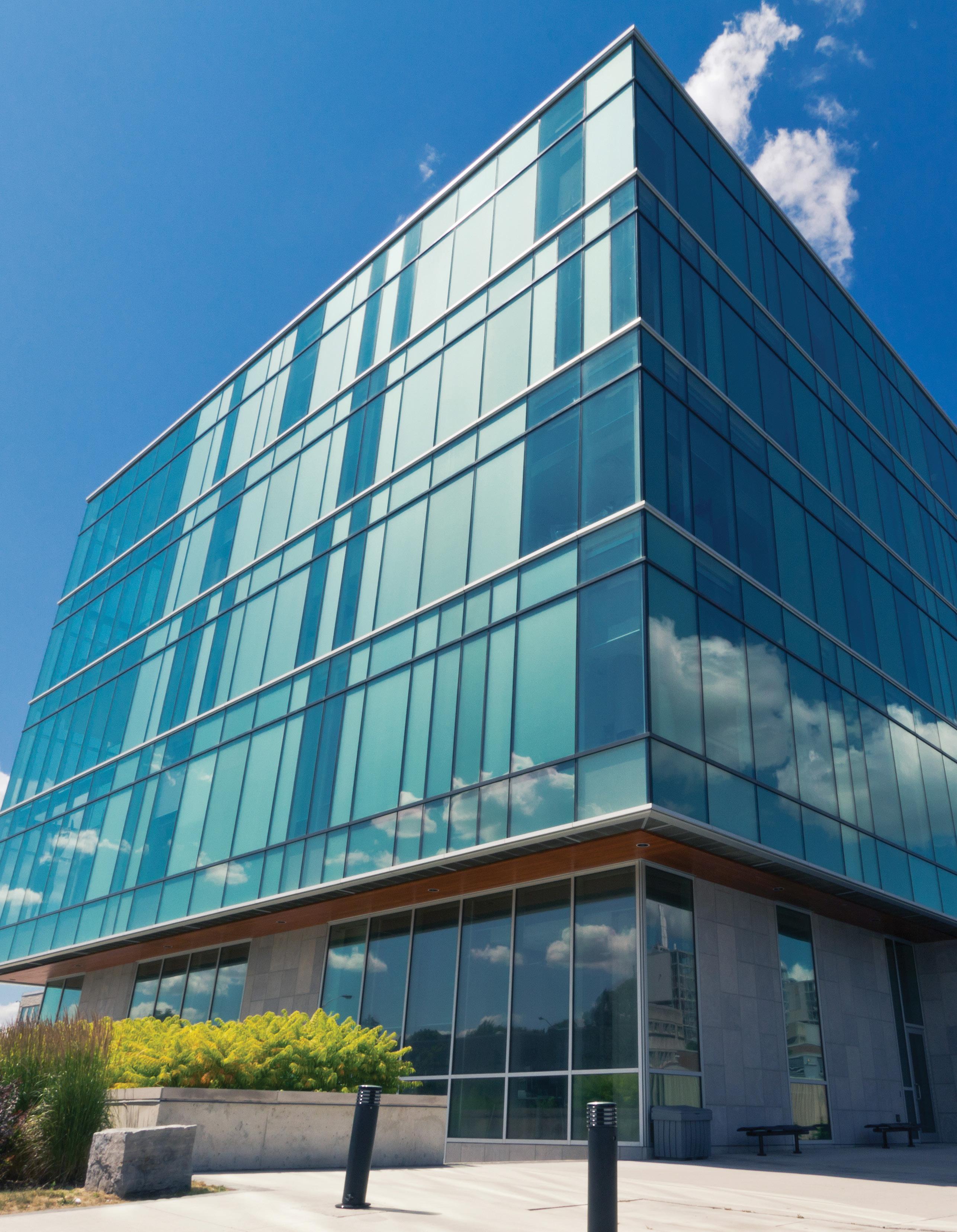
McMaster Engineering is committed to the pursuit of excellence and plays a significant role in helping McMaster University earn its reputation as one of Canada’s most innovative universities. Created in 1958, the Faculty of Engineering at McMaster is committed to research with impact and transforming the education of engineering through The Pivot - the first program of its kind to intensely focus on our engineering students and their learning.
The urgent need for future-ready students is colliding with traditional engineering pedagogy, making a new, re-imagined and redefined educational journey essential. It is one that must combine complex problem solving, critical thinking, adaptability and creativity to prepare students for a world of disruption, collision and creative forces. Experiential learning is key to our students’ success.
6 Faculty of Engineering | Annual Report 2022
7,198 total students 42.6M in external research funding 184 administrative & technical staff 20+ research centres, institutes and networks #5 188 in program reputation and #6 overall by Maclean’s Ranked faculty members 100 top 32 programs in the 2022 Shanghai Ranking Our Civil, Metallurgical and Transportation programs are among the research chairs $
McMaster Engineering offers more than bestin-class degrees. Comprised of three schools that offer a diverse range of programs, students can customize their educational experiences to cater to their interests and career aspirations.
We offer multifaceted educational experiences that help create global-ready, socially-aware citizens through projectbased classes, flexible co-op work terms, research opportunities and dozens of clubs and teams.
The School of Engineering and Applied Sciences (SEAS) comprises our seven core departments, with offerings at the undergraduate and graduate levels.
Degree+ Options: Unique Five-Year Undergraduate Programs
Our flexible five-year programs offer students a world-class engineering education with departments and other Faculties across the university such as Health Sciences and Business.
Engineering & Management (BEngMgmt) or Engineering & Society (BEngSociety)
• Offered in the engineering program, with entry through the common first year Engineering I.
• Not available for Chemical Engineering & Bioengineering.
Engineering & Biomedical Engineering (BEngBME)**
• Offered in the Integrated Biomedical Engineering & Health Sciences (iBioMed) program, with entry through the common first year IBEHS1.
• Not available for Computer Engineering or Chemical Engineering & Bioengineering.
Chemical Engineering & Bioengineering (BEngBiosci)
• Offered in the engineering program, with entry through the common first year Engineering I.
• This program cannot be combined with an Engineering and Management degree (BEngMgmt) or Engineering and Society (BEngSociety) degree.
SCHOOL OF ENGINEERING AND APPLIED SCIENCES (SEAS)
GRADUATE PROGRAMS UNDERGRADUATE PROGRAMS
CHEMICAL ENGINEERING
MASc Chemical Engineering BEng Chemical Engineering
PhD Chemical Engineering BEngBiosci Chemical & Bioengineering**
CIVIL ENGINEERING
MASc Civil Engineering BEng Civil Engineering
MEng Civil Engineering
PhD Civil Engineering
COMPUTING
& SOFTWARE
MASc Software Engineering BASc Computer Science**
MEng Computing & Software BEng Mechatronics Engineering
MSc Computer Science BEng Software Engineering
MSc eHealth***
PhD Computer Science PhD Software Engineering
ELECTRICAL & COMPUTER ENGINEERING
MASc Electrical & Computer Engineering BEng Computer Engineering
MEng Electrical & Computer Engineering BEng Electrical Engineering
MEng Electrical & Biomedical Engineering*
PhD Electrical & Computer Engineering
ENGINEERING
PHYSICS
MASc Engineering Physics BEng Engineering Physics
MEng Engineering Physics
MEng UNENE Nuclear Engineering
GDip UNENE Nuclear Engineering PhD Engineering Physics
MATERIALS SCIENCE & ENGINEERING
MASc Materials Engineering BEng Materials Science & Engineering
MSc Materials Science
PhD Materials Science & Engineering PhD Materials Engineering
MECHANICAL ENGINEERING
MASc Mechanical Engineering BEng Mechanical Engineering
PhD Mechanical Engineering
* Program effective for students from September 2017 or earlier
** All SEAS undergraduate programs can be combined with an Engineering and Management degree (BEngMgmt)
or Engineering and Society (BEngSociety) except the specified program
*** Offered jointly by Faculties of Engineering, Health Sciences and the DeGroote School of Business
W BOOTH SCHOOL OF ENGINEERING PRACTICE AND TECHNOLOGY (SEPT)
GRADUATE PROGRAMS
MEEI/MTEI Engineering/Technology Entrepreneurship & Innovation
MEPP Engineering & Public Policy
MEng Engineering Design
MEng Manufacturing Engineering
MEng Systems & Technology
McMaster-Mohawk Combined Degree/Diploma Programs
UNDERGRADUATE PROGRAMS
BTech Automotive & Vehicle Engineering Technology
BTech Automation Engineering Technology
BTech Biotechnology
DEGREE COMPLETION PROGRAMS
BTech Civil Engineering Infrastructure Technology
BTech Power & Energy Engineering Technology
BTech Manufacturing Engineering Technology
BTech Software Engineering Technology
SCHOOL OF BIOMEDICAL ENGINEERING
MASc Biomedical Engineering
MD/PhD Biomedical Engineering
PhD Biomedical Engineering
The W Booth School of Engineering Practice and Technology (SEPT) is an innovative school that blends academic theory with engineering practice. Through a unique partnership with Hamilton’s Mohawk College, students gain handson education and transferable skills to produce engaged graduates with expertise tailored to industry’s needs.
Minors
Minor in Innovation
Offered jointly by the Faculty of Engineering and the DeGroote School of Business, the Minor in Innovation is designed to give students the tools they need to succeed in today's fast-paced, innovation-driven marketplace. The minor is open to all McMaster University students.
Minor in Computer Science
Engineering students with this minor gain skills in programming, software design, systems and theory.
The School of Biomedical Engineering is a joint graduate program offered by the Faculties of Engineering and Heath Sciences which provides research-based, interdisciplinary programs.
8 Faculty of Engineering | Annual Report 2022 McMaster Engineering BRIGHTER WORLD 9
Program Overview
10 Faculty of Engineering | Annual Report 2022 McMaster Engineering BRIGHTER WORLD 11 SEPT % Women SEAS % Women SEAS Women
SEPT Men SEPT Women SEPT
3,034 709 2,989 725 3,155 802 3,033 847 3,121 942 3,016 1,084 3,425 1,366 11 19 33 3,285 1,069 207 54 1,034 188 45 921 166 30 836 156 29 812 143 13 790 137 731 117 731 103 1 1,422 23 8 18.9%
12.4%
2014-15 2015-16 2016-17 2017-18 2018-19 2019-20 2020-21 2021-22 % Women SEAS % Women SEAS
SEPT Men SEPT Women SEPT
3,034 709 2,989 725 3,155 802 3,033 847 3,121 942 3,016 1,084 3,425 1,366 11 19 33 3,285 1,069 207 54 1,034 188 45 921 166 30 836 156 29 812 143 13 790 137 731 117 731 103 1 1,422 23 8 18.9% 19.5% 20.3% 21.8%
12.4% 13.8% 14.8% 14.8% 15.3% 14.8%
2014-15 2015-16 2016-17 2017-18 2018-19 2019-20 2020-21 2021-22 SEPT % Women SEAS % Women SEAS Women SEAS Another Identity/Unknown SEAS Men SEPT Men SEPT Women 25.2% 29.6% 24.1% 25.9% 26.6% 32.3% 26% 36.7% 27.4% 28% 23.3% 30% 30.1% 30.5% 30.5% 24.2% 566 191 514 180 510 185 578 204 584 227 595 255 576 248 1 2 599 209 67 92 40 163 50 148 56 90 52 72 34 66 21 50 21 263 2 2014-15 2015-16 2016-17 2017-18 2018-19 2019-20 2020-21 2021-22 SEPT % Women SEAS % Women SEAS Women SEAS Another Identity/Unknown SEAS Men SEPT Men SEPT Women 25.2% 29.6% 24.1% 25.9% 26.6% 32.3% 26% 36.7% 27.4% 28% 23.3% 30%
566 191 514 180 510 185 578 204 584 227 595 255 576 248 1 2 599 209 67 92 40 163 50 148 56 90 52 72 34 66 21 50 21 263 2 2014-15 2015-16 2016-17 2017-18 2018-19 2019-20 2020-21 2021-22 SEAS 24% 27% 35% 33% 34% 41% Fall 2017 Fall 2018 Fall 2019 Fall 2020 Fall 2021 Fall 2022 SEAS 24% 27% 35% 33% 34% 41% Fall 2017 Fall 2018 Fall 2019 Fall 2020 Fall 2021 Fall 2022 SEPT % Women SEAS % Women SEAS Women SEAS Another Identity/Unknown SEAS Men SEPT Men SEPT Women SEPT Another Identity/Unknown 3,034 709 2,989 725 3,155 802 3,033 847 3,121 942 3,016 1,084 3,425 1,366 11 19 33 3,285 1,069 207 54 1,034 188 45 921 166 30 836 156 29 812 143 13 790 137 731 117 731 103 1 1,422 23 8 18.9% 19.5% 20.3% 21.8% 23.1% 26.3% 28.3% 30.1% 12.4% 13.8% 14.8% 14.8% 15.3% 14.8% 14.9% 15.5% 2014-15 2015-16 2016-17 2017-18 2018-19 2019-20 2020-21 2021-22 SEPT % Women SEAS % Women 25.2% 29.6% 24.1% 25.9% 26.6% 32.3% 26% 36.7% 27.4% 28% 23.3% 30% 30.1% 30.5% 30.5% 24.2% 566 191 514 180 510 185 578 204 584 227 595 255 576 248 1 2 599 209 67 92 40 163 50 148 56 90 52 72 34 66 21 50 21 263 2 2014-15 2015-16 2016-17 2017-18 2018-19 2019-20 2020-21 2021-22 Incoming Women Engineers, as % of total
Graduate Women Enrolment McMaster Engineering: By the Numbers 0 2000 3000 1000 4000 5000 6000 7000 2021-22 2020-21 2019-20 2018-19 2014-15 2015-16 2016-17 2017-18 4577.0 4561.7 4883.8 5096.2 5235.2 6090.1 6058.6 4855.7 827.9 780.1 800.3 1015.0 1062.7 958.1 1139.3 923.7 Undergraduate and Graduate FTE Enrolment
SEAS Another Identity/Unknown SEAS Men
Another Identity/Unknown
19.5% 20.3% 21.8% 23.1% 26.3% 28.3% 30.1%
13.8% 14.8% 14.8% 15.3% 14.8% 14.9% 15.5%
Women SEAS Another Identity/Unknown SEAS Men
Another Identity/Unknown
23.1% 26.3% 28.3% 30.1%
14.9% 15.5%
30.1% 30.5% 30.5% 24.2%
Undergraduate Women Enrolment
12 Faculty of Engineering | Annual Report 2022 McMaster Engineering BRIGHTER WORLD 13 SEPT % Intl SEAS % Intl 2014-15 2015-16 2016-17 2017-18 2018-19 2019-20 2020-21 2021-22 59.1% 48.5% 63.4% 48.7%
49.1%
389 367 356 338 354 341 367 415 371 439 345 474 345 482 339 525 29 42 32 55 31 75 35 107 42 162 35 178 55 77 64 212 SEAS Intl SEAS Dom SEPT Intl SEPT Dom SEPT % Intl SEAS % Intl 2014-15 2015-16 2016-17 2017-18 2018-19 2019-20 2020-21 2021-22 59.1% 48.5% 63.4% 48.7% 70.7% 49.1% 75.3% 53.0%
54.2%
389 367 356 338 354 341 367 415 371 439 345 474 345 482 339 525 29 42 32 55 31 75 35 107 42 162 35 178 55 77 64 212 SEAS Intl SEAS Dom SEPT Intl SEPT Dom 10.7%
SEAS Intl SEAS Dom SEPT Dom SEPT Intl 3,343 400 780 54 786 62 843 84 857 111 882 140 951 165 1,056 211 1,099 231 3,296 417 3,454 503 3,311 577 3,432 643 3,374 745 3,927 896 3,869 859 2014-15 2015-16 2016-17 2017-18 2018-19 2019-20 2020-21 2021-22 2014-15 2015-16 2016-17 2017-18 2018-19 2019-20 2020-21 2021-22
BEng BME BEng (Includes Management & Society) BASc BTech SEPT % Intl SEAS % Intl 59.1% 48.5% 63.4% 48.7% 70.7% 49.1% 75.3% 53.0% 79.3% 54.2% 83.7% 57.9% 58.3% 58.3% 76.9% 60.7% 389 367 356 338 354 341 367 415 371 439 345 474 345 482 339 525 29 42 32 55 31 75 35 107 42 162 35 178 55 77 64 212 SEPT % Intl SEAS % Intl 10.7% 6.5% 11.2%
12.7% 9.1% 14.8% 11.4% 15.8% 13.7% 18.1% 14.8% 18.6% 16.7% 18.2% 17.4% SEAS Intl SEAS Dom SEPT Dom SEPT Intl 3,343 400 780 54 786 62 843 84 857 111 882 140 951 165 1,056 211 1,099 231 3,296 417 3,454 503 3,311 577 3,432 643 3,374 745 3,927 896 3,869 859 2014-15 2015-16
2017-18
SEAS SEPT 756.3 71.6
2014-15
SEAS SEPT 756.3 71.6
2014-15 2015-16
2017-18
70.7%
75.3% 53.0% 79.3% 54.2% 83.7% 57.9% 58.3% 58.3% 76.9% 60.7%
79.3%
83.7% 57.9% 58.3% 58.3% 76.9% 60.7%
6.5% 11.2% 7.3% 12.7% 9.1% 14.8% 11.4% 15.8% 13.7% 18.1% 14.8% 18.6% 16.7% 18.2% 17.4%
3522.7 834.0 220.3 240.1 206.8 237.7 347.0 487.8 468.4 572.2 370.0 265.4 232.1 121.4 243.2 3473.6 848.0 3713.8 926.8 3605.3 3506.7 3965.6 3688.4 3560.2 967.3 1021.1 1116.2 1266.8 1329.6
7.3%
2016-17
2018-19 2019-20 2020-21 2021-22 Graduate International Enrolment Undergraduate Enrolment by Degree Undergraduate International Enrolment
86.8 693.3 694.2 106.1 780.3 142.1 809.7 204.3 850.1 212.6 826.1 132.0 863.7 275.6
2015-16 2016-17 2017-18 2018-19 2019-20 2020-21 2021-22
86.8 693.3 694.2 106.1 780.3 142.1 809.7 204.3 850.1 212.6 826.1 132.0 863.7 275.6
2016-17
2018-19 2019-20 2020-21 2021-22 Graduate Enrolment
14 Faculty of Engineering | Annual Report 2022 McMaster Engineering BRIGHTER WORLD 15 2016-17 2017-18 2018-19 2019-20 2020-21 2021-22 $28.1M $6.2M $34.3M $36.9M $6.0M $42.9M $37.7M $5.6M $43.3M $50.4M $4.4M $54.8M $40.6M $3.7M $44.3M $35.2M $7.6M $42.8M 60.2% 11.4% 22.6% 5.7% Canadian Federal Ontario Provincia Corporate Other $4.2M $691K $4.8M $5.7M $1.3M $6.9M $9.5M $1.7M $11.2M $9.9M $1.3M $11.2M $7.7M $2.8M $10.5M $9.7M $3.4M $13.0M 2016-17 2017-18 2018-19 2019-20 2020-21 2021-22 2016-17 2017-18 2018-19 2019-20 2020-21 2021-22 $188K $245K $253K $325K $254K $218K Research Funding by Sponsor Research Funding Corporate & Non-profit Funding Research Intensity Research Infrastructure Research Operating Research Infrastructure Research Operating
Inclusive Excellence
Each year the Faculty strives to build on the excellence of our students, faculty and staff. Drawing on diverse perspectives from our community is key to creating meaningful and widespread impact.
Among our highest achievements was welcoming a record-breaking number of women to our Fireball Family. Women make up 40% of our first-year engineering class in 2022.
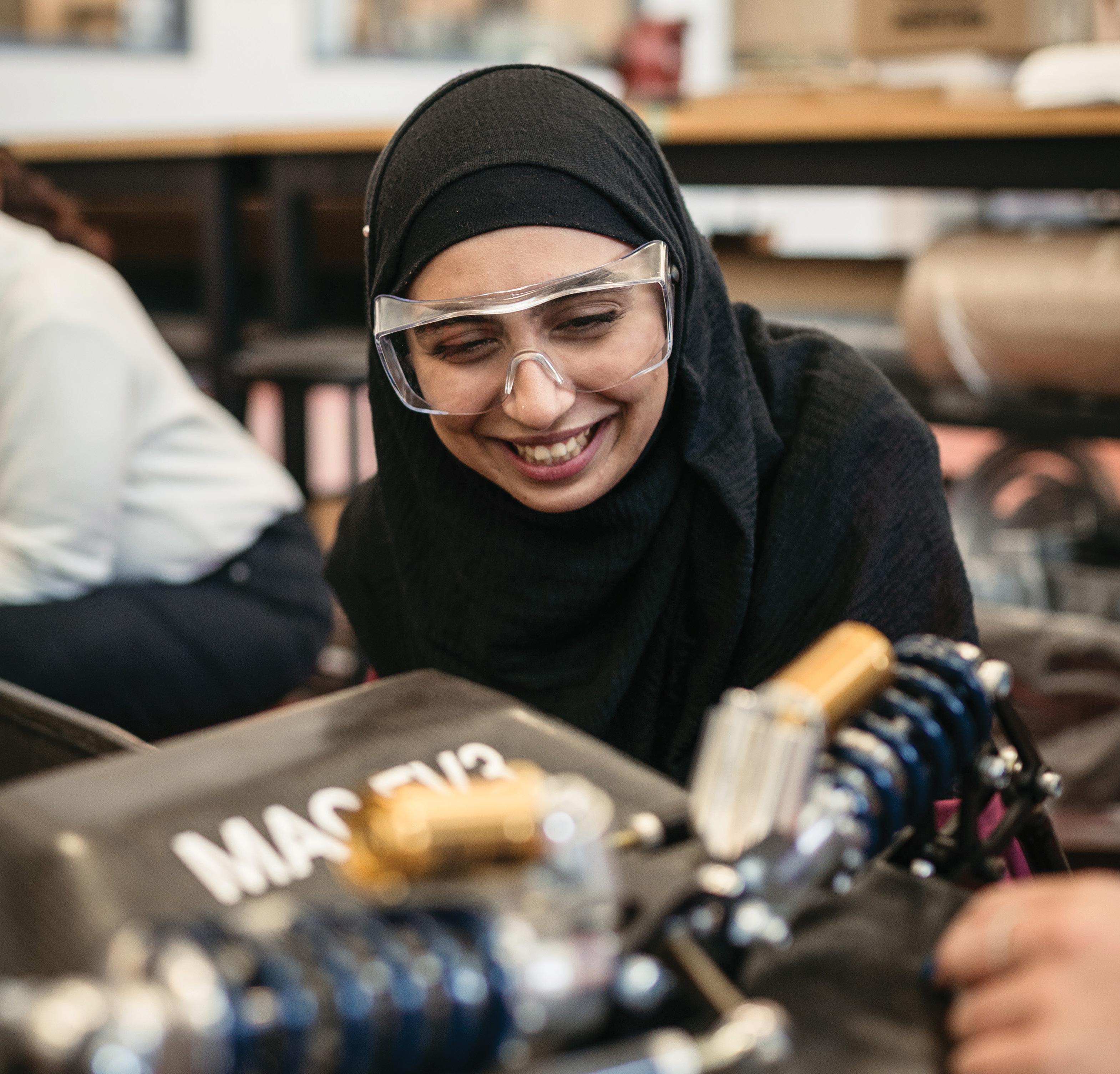
16 Faculty of Engineering | Annual Report 2022
Women make up 40 per cent of McMaster Engineering’s first-year engineering class
In
Only a few decades ago, women made up a very small proportion of engineering students across the country.
Today, many of Canada’s most promising young women see themselves as future engineers: problem-solvers capable of making change and addressing society’s most wicked challenges.
This year, McMaster Engineering has reached a new equity milestone, with 40 per cent of first-year engineering students being women.
She says the university’s outreach efforts have succeeded in connecting with girls and showing them that they can make a difference in the world through engineering.


McMaster Engineering BRIGHTER WORLD 19
“It’s an incredible accomplishment,” says Dean of Engineering, Heather Sheardown, who recently became the first woman to move into the position.
the last six years, the representation of women students increased by 18 per cent at Mac Eng.
Building an engineering program that truly reflects Canadian society remains McMaster’s priority, says Sheardown.
Here are a few of the talented young women making up this year’s first-year undergraduate class:
Chelsey Ellis developed a love for biology, health and the human body in her earliest years. Her mother, a family physician, fostered that interest with books and gifts related to human anatomy. But when a Grade 12 class showed her how science could be applied to human health through technologies like gene editing, 3D bioprinting and wearable devices, she knew her future was in engineering.

“I realized that I wanted to be able to apply the science I was learning right away.”
And as a Muslim woman who speaks five languages, Mudassar also aims to be a role model who helps “shape a world where talent and passion are valued, regardless of who you are or where you are from.”
Neaha Bijo intends to study artificial intelligence. She wants to contribute to space exploration by incorporating AI into rovers, but also dreams of building a smart home to help older people with day-to-day activities and make it easier for them to live independently.
She says her mother, a civil engineer, is her biggest supporter and she believes she will succeed as a woman in engineering because it is an innovative field that’s always looking for ideas.


Julia Dowson says participating in an all-girls LEGO Robotics team in middle school helped inspire her to study engineering. She also has a passion for music, playing in her high school band and earning a scholarship for her dedication and skill. While still waiting to see where her studies lead her, she hopes to inspire other young women to study STEM subjects.

20 Faculty of Engineering | Annual Report 2022 McMaster Engineering BRIGHTER WORLD 21
“We’ve known forever that diverse teams generate better solutions because we’re not all thinking from the same place. The more perspectives we can get, the better the solutions we’ll come up with.”
“Diversity brings more ideas to the field. Each person is distinct, and it is this distinctness that fosters innovation.”
to choose between religion and STEM and that becoming an engineer who wears a hijab is possible and beneficial.”
Javayria Mudassar was awarded a prestigious Schulich Leader Scholarship in recognition of her academic excellence and leadership. An aspiring astronaut, she wants to contribute to new technologies that better our understanding of the universe.
“I also hope to be a strong woman leader for people to look up to.”
Inclusive Excellence Highlights
Heather Sheardown becomes the Faculty’s first woman Dean
Sheardown brings more than 25 years of diverse academic research, administrative and teaching experience to the position. She joined McMaster in 1998 as an Assistant Professor in the Department of Chemical Engineering. She was the only woman faculty member at the time. Sheardown is currently the Scientific Director for C20/20 Ophthalmic Materials Commercialization (C20/20 Innovation Hub; 2016-present).
Sarah Dickson-Anderson becomes Acting Associate Dean, Academic
Dickson-Anderson has been with McMaster for two decades. In the past 20 years, she has served as associate chair, graduate and led the civil engineering department as acting chair on multiple occasions. Dickson-Anderson’s research focuses on water security in rural, remote and marginalized communities.
Creation of an Indigenous Working Group
Made up of faculty, staff and student advisors, the working group strives to establish a fulsome picture of all points of engagement with Indigenous communities currently taking place among the faculty and develop an understanding of university-wide policies, projects and activities that engage Indigenous communities.
Giving Day
McMaster’s inaugural Day of Giving on May 11 raised more than $2.8 million and engaged 1,220 members of the university community through giving and participation in events. This one-day, university-wide fundraising campaign focused on supporting Black student excellence, Indigenous priorities and equity-deserving communities at McMaster.
In Engineering, this translated to $90K in philanthropic dollars donated by over 30 alumni towards the National Society of Black Engineers (NSBE) Scholarship fund.
Black Faculty Cohort Hiring Initiative
Civil Engineering professor, Paulin Coulibaly, is part of the African Caribbean Faculty Association at McMaster (ACFAM), which is involved in a cohort hiring initiative at McMaster University with the goal of up to 12 appointments of emerging and established academics and scholars who will contribute to the advancement of Black academic excellence across all six Faculties. As part of this initiative, five Black Scholars were hired by Mac Eng in 2021-2022. Two more Black Scholars will join the Faculty on January 1, 2023.

“Regardless of who we are or where we come from – race, colour, creed – one thing that we all share is hope. We all have it within us: a desire for something better. Hope is what unites us.”
Honorary doctoral degree recipient Barry Hill, BEng (Class of ’66) and MEng (Class of ’68), launches Indigenous engineering student scholarship.

Programming and scholarship for equity deserving groups
McMaster Engineering has partnered with five other Ontario universities (Waterloo, Ottawa, UofT, Queen’s and Western) to release a Fellowship to expand the pathways for Indigenous and Black students pursuing doctoral degrees in engineering.

Hamidu Mbonde PhD student in engineering physics, is one of 15 Black students worldwide awarded with the prestigious Optica Amplify Scholarship.

The National Society of Black Engineers (NSBE)
McMaster Chapter has established a scholarship that will be awarded annually to Canadian Black students entering the Faculty of Engineering at McMaster.
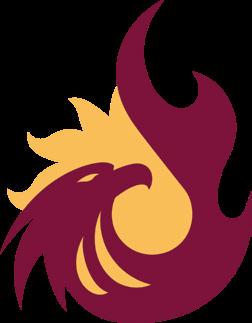

Halima Banuso is the inaugural recipient of the NSBE Entrance Award. The Materials & Society student presented her research project on utilizing slag, a steel production by-product, for sustainable construction applications at the 2022 Annual Undergraduate Research Showcase.

McMaster Engineering BRIGHTER WORLD 23
“Our pursuit of EDI is simply from my viewpoint a pursuit of justice...Whenever a systemic barrier is removed it makes our entire society more just.”
“This community loves to celebrate each other’s successes and lift one another up and I truly appreciate the friends that I have made here.”
Teaching and Learning
McMaster Engineering takes pride in equipping our students with the knowledge and skills needed to change the world. Through The Pivot, our transformed curriculum, students are learning to be resilient, calculated risk-takers who are intellectually curious and unfazed by failure. Experiential learning is integrated into every facet of the student journey.
Co-op opportunities, community-focused co-curricular activities, clubs and teams and Canada’s largest undergraduate research program educate the whole engineer.

24 Faculty of Engineering | Annual Report 2022
Mac alumnus and teammate win the James Dyson Global Sustainability Award
McMaster engineering graduate Swaleh Owais and his business partner Yang Cheng won the prestigious 2022 James Dyson Global Sustainability Award for Polyformer, an open-source machine that turns used plastic bottles into 3D printer filament.

Polyformer is a financially and environmentally sustainable solution for communities around the globe tackling issues of plastic waste, accessibility and production.
The idea for Polyformer came together when the pair wanted to solve two problems using one solution. Cheng wanted to create an innovative way to recycle plastic bottles and Owais was passionate about making 3D printer filament cheaper in developing countries.

3D printing has made products and accessories — from wrenches to fidget spinners — accessible to communities where they are otherwise too expensive to produce or purchase. But the price of the filament used in 3D printing is often inflated or too expensive to ship in for these communities.
At a cost-efficient price of $150 total, Polyformer breaks down these barriers.
Not only does Polyformer support the development of affordable 3D-printed products and tools, but it also establishes rewarding recycling infrastructure where there may not be one in place and helps tackle the growing problem of plastic waste.
Owais’ passion for engineering began at a young age, as he credits competing in robotic competitions in middle school as the beginning of his interest in innovation. Those passions propelled him even further when he attended McMaster and obtained his mechanical engineering degree in 2021.
Owais will be returning to the original makerspace he was working at in Rwanda during the initial development of the Polyformer with an even more ambitious goal - to create a Polyformer machine from scratch using only locally resourced supplies.
How it works
The first step is to build a Polyformer machine, which is easier than you’d think. Polyformer is an open-source community project with the CAD, code, and building instructions available for free online. People interested in building this machine can buy the full building kit online.
Once the machine is built the user cuts plastic bottles into a long continuous strip using a custom, easy-to-use bottle cutter mechanism. The user feeds the plastic strip into the machine, where it will turn into 3D printer filament spool that can be released and put directly into a 3D printer.
“This goal that I have to create the machine entirely from locally available material will prove that the design can be built in a low resource setting like Rwanda and communities across the globe so that they can also have access to low cost 3D printer filament,” explains Owais.
McMaster Engineering BRIGHTER WORLD 27
“We picked the Polyformer because buying the plastic you need for rapid prototyping machines is very, very expensive,” says Sir James Dyson, founder and chief engineer of Dyson.
Mac Eng grads win two James Dyson Awards
Mechanical engineering alumni win National James Dyson Award
Teamwork, diligence and an inspiration named Beatrice helped a team of final-year mechanical engineering students capture the 2022 Canadian James Dyson Award.

Their invention – a knife guide designed to improve the lives of people suffering from Parkinson’s disease, hand tremors or other mobility issues – was created as a group project in a product design class.
The simple but elegant assistive device slips easily under a cutting board to provide a safe way for Parkinson’s patients to slice food.

It earned students Afeef Khan, Eden Lazar, Caitlin Kuzler and Clayton MacNeil the national award.
The team named their device Taco – after an early tacoshaped version – and say it was inspired by the struggles of Beatrice, a patient at a care home where Lazar volunteered.
Beatrice suffers from severe Parkinson’s disease, making it dangerous to use a knife and forcing her to rely on caregivers to prep her food.
By designing a tool to hold her knife in a safe, effective cutting position, the team saw an opportunity to give her more independence and improve her quality of life.
Starting with a small plastic 3D-printed model, the students progressed through a half-dozen design modifications, making improvements based on testing and feedback.
They are now investigating the business case for bringing Taco to market, with Khan working full-time on the endeavour. He is seeking to establish a relationship with McMaster’s business incubator The Forge and talking to the McMaster Manufacturing Research Institute (MMRI) about producing a first small batch of products.
Assistant Professor Elizabeth Hassan taught Topics in Product Development, the course that inspired the award-winning device. The course promotes real-world learning by having students analyze case studies using modern product development methods, value engineering, product specification, rapid product development, lean design and continuous improvement.
“That reflects what is going on in the broader engineering program – incorporating real-time feedback to students when they are actually able to do something with it, before they’ve finalized their work.”
Khan.
28 Faculty of Engineering | Annual Report 2022
“We wanted to make sure we were creating something that would have an impact on people’s day-to-day lives,” explained
McMaster Commemorative Torch Challenge
Mechanical Engineering students, Anna Esposito, Sebastian Tattersall, and Computer Engineering and Management student, Yuvraj Sandhu, designed a special torch that travelled to the Netherlands, created to commemorate the Dutch Liberation and honour Canadian troops in a pilgrimage for the event’s anniversary.
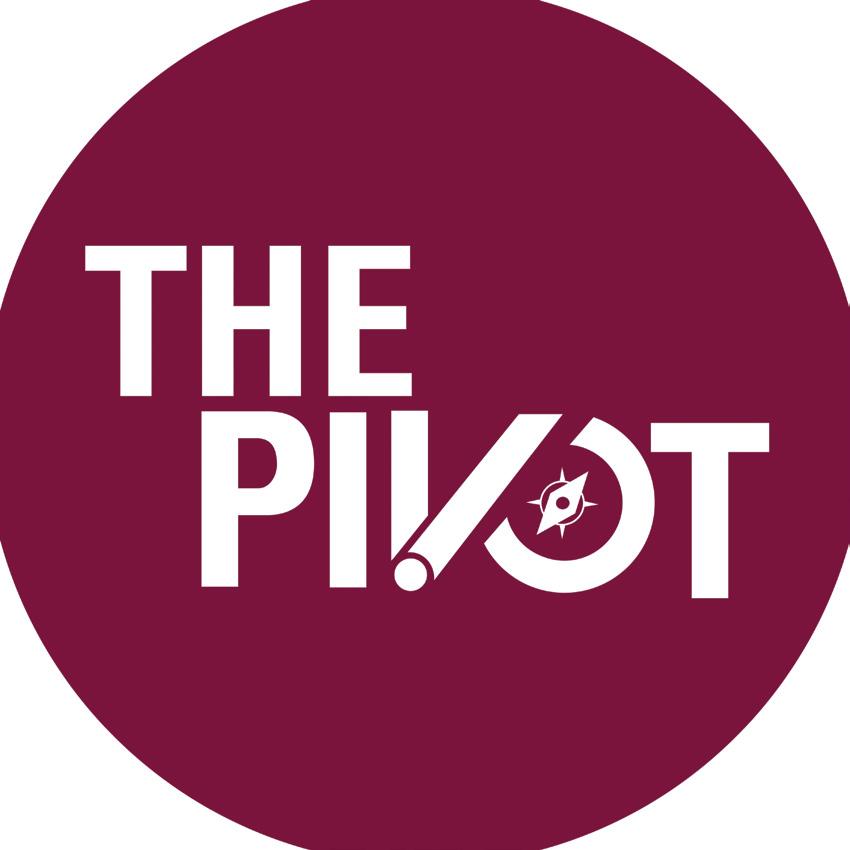
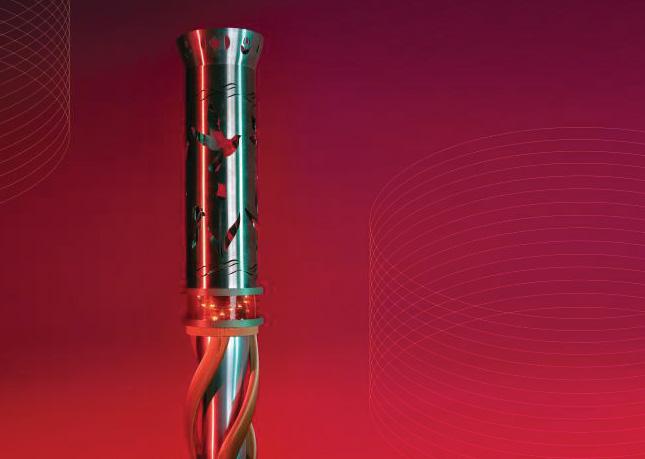
Teaching and Learning Highlights
McMaster Engineering earns successful accreditation
McMaster Engineering earned a successful accreditation by the Canadian Engineering Accreditation Board (CEAB) in June 2022. This was the largest ever single visit in CEAB history. A 45-member team, made up of administrative and technical staff, successfully executed this challenge. This was also the first successful accreditation of iBioMed programs.
Capstone Event
April 12 was a busy day for our graduating students as they showed off their capstone projects at a virtual and in-person expo. Around 3,000 conversations happened during the virtual fair, with 500 alumni, industry partners and McMaster community members signing in.
Undergraduate Research Showcase
McMaster Society for Engineering Research (MacSER) and Engineering Co-op Career Services (ECCS) hosted its fifth Annual Undergraduate Research Showcase. There were more than 50 poster presentations on research areas such as the ethics of artificial intelligence and data collection, characterization of bone structure, electrochemical biosensing, zinc ion batteries and more.
Engineers in the Community
Engineers in the Community is a new Equity, Diversity, Inclusion and Decolonization e-course for engineering students. Students are introduced to a paradigm shift in the engineering and technology professions with a focus on some of the most pressing social, environmental and human-centred issues of our time. This requires a humanistic understanding of our society in order to design engineering solutions that reflect social issues, cultural diversity and environmental stewardship. Topics include Indigenous perspectives, racism and inclusion, gender diversity and poverty.
Aayan Siddiqui, Alex Trinh and Spencer Vandenbosch presented Handular, a device that assists in pouring a teapot at the 2022 Integrated Cornerstone Design Projects in Engineering (1P13) year-end showcase.
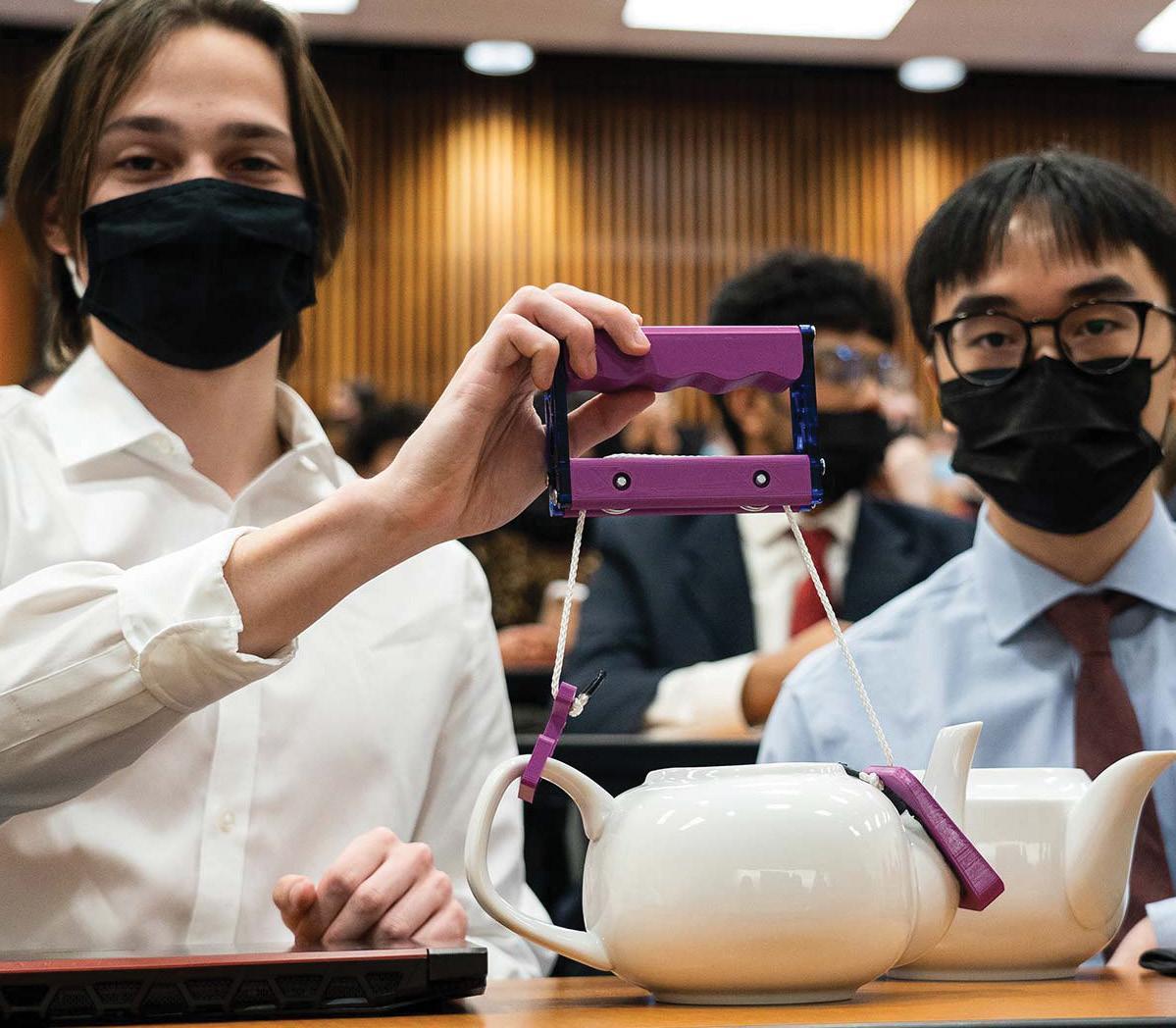
We are working towards embedding experiential learning into all years of the engineering curriculum to create the engineers of the future. This includes the development of new courses that cut across the disciplines.
Launched in 2020, the Integrated Cornerstone Design Projects in Engineering (1P13) is a project-based course that gives first-year students the fundamentals of engineering while putting design thinking, entrepreneurialism and real-world problem solving at the forefront. In January 2022, the Integrated Engineering Design Project (2PX3) course was introduced to second-year students who worked on technical communication and design complexity through four sophisticated design projects over the course of the term. Coming in January 2023, the Integrated Engineering Design Project 3 (3PX3) will teach core engineering economics concepts and reinforce application with design studio projects.
30 Faculty of Engineering | Annual Report 2022 McMaster Engineering BRIGHTER WORLD 31
“We were constantly refining our solution to make it more viable...We were very elated to see that it actually worked and that our final product was something that we could be pretty proud of.”
Co-op and Careers
Aligning classroom learning with industry experience supports the career development and career readiness of McMaster Engineering students. Our investment in delivering meaningful experiences where students engage in real-world environments and scenarios supports this goal and prepares our students for complex and evolving labour market needs.
Co-op Student of the Year Award winners
Aurora Selim
BTech Biotechnology ThermoFisher Scientific
Aurora joined TFS as a Process Engineering co-op student. Her focus in this role was to maintain the daily readiness files that were used by the team for project status reports and assist Process Engineering specialists.
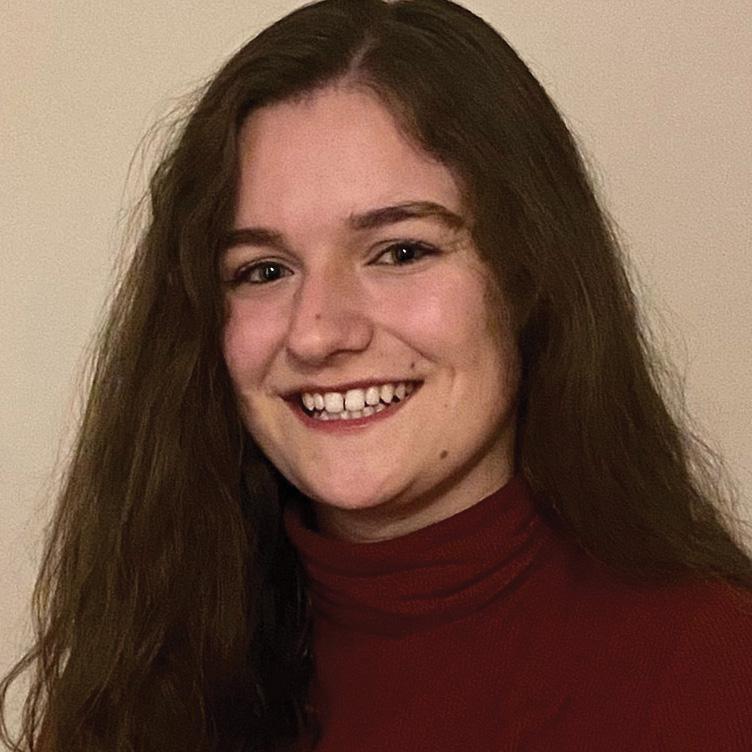
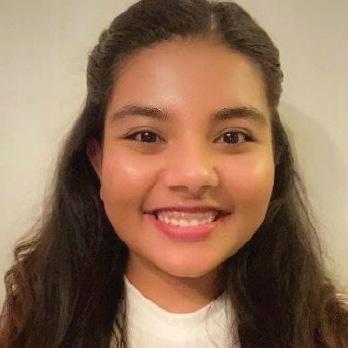
Daniel Wise
Mechatronics ATG Pharma Inc.
Daniel was a crucial member at ATG working as an R&D Engineering Intern. His first project was to develop the full electrical, mechanical and software packages of the Cartridge Depositor –a heated syringe-like dispenser head.
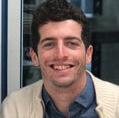
Sahar Asgari
Mechanical Engineering PhD Ministry of Health
Sahar worked as a Data Scientist co-op student for the Ministry of Health. Her main task was automating the deliverance of COVID-19 analyses to clients.
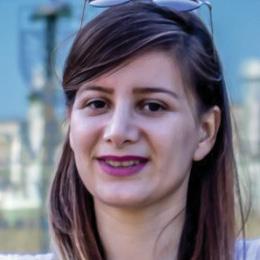
“She has maintained a firm commitment to bettering the world around her, whether through environmental improvements, biomedical approaches or recommending interventions for more inclusive engineering education. This interdisciplinary excellence gives Shay the potential to make breakthroughs in engineering that will fundamentally improve our society,” says Kim Jones, mentor for Earle and associate professor in chemical engineering.
In 2021-22, Engineering
Co-op and Career Services achieved record-breaking numbers for co-op work experiences at both the undergraduate and graduate levels.
Undergraduate
4,066 registered work terms in 2021/22
Graduate
Co-op Student Spotlight
Shayna Earle completed an industrial co-op at Bunge Hamilton in the chemical engineering and biomedical program and was awarded the Canadian Engineering Memorial Foundation’s Enbridge Award to continue her incredible work supporting women in engineering. She is the co-president of the McMaster Women in Engineering Society, which works to help women and non-gender conforming individuals feel empowered and supported.
32 Faculty of Engineering | Annual Report 2022 McMaster Engineering BRIGHTER WORLD 33
111%
increase 169 registered work terms in 2021/22
25%
increase
Research and Scholarship

McMaster Engineering is the go-to place for world-class researchers and collaborators who share our values and commitment to working together across disciplines, sectors and borders to develop knowledge, tackle global issues and advance human understanding. In 2022 we had achievements in bio-innovation, smart systems, energy and environmental sustainability; created new commercial partnerships; and worked toward tackling the United Nations Sustainable Development Goals.
McMaster and Cubic Corporation’s Cubic Transportation Systems (CTS) business division partnered to launch Mobility Cube. This long-term program co-led by Ali Emadi, Canada Research Chair in Transportation Electrification and Smart Mobility, and experts from the McMaster Automotive Resource Centre (MARC) will develop the building blocks to design the future of inclusive mobility through innovation and technology collaboration between government, academia and the public and private sectors.
34 Faculty of Engineering | Annual Report 2022
The Women Behind Mobility Cube
Vera Pantelic
As a leader, Vera Pantelic finds power in the transformational magic of providing opportunities.
It’s been nearly 20 years since Pantelic came to McMaster University from Serbia, when she committed to a master’s program that grew into a PhD and career at McMaster.
She’s a Senior Principal Research Engineer at the world-renowned McMaster Centre for Software Certification and McMaster Automotive Resource Centre and an Adjunct Assistant Professor at the Department of Computing and Software.

Mobility Cube is not only an occasion to shape the future of mobility, she said, but to build the competent, independent and self-confident “workforce of the future.”
Pantelic thrives on helping students get hands-on experience using the latest technologies as they research world-leading problems such as traffic congestion and environmental pollution.
It’s amazing to witness the progression in confidence, she said, as she assists budding engineers invent, design and implement software tools, methods and end systems.
“I believe it’s the most rewarding part of my work,” she said. “You see this growth from junior years to competent and independent engineers.”
At Mobility Cube, her leadership extends over an array of technical areas — performance analysis, cloud computing, software architecture and testing, model-based development and simulation and machine learning – as well as communication with Cubic.
She explained that a key learning opportunity ingrained in the collaboration is for students to understand that the crux of engineering goes beyond “math and science” – it relies on communication and teamwork too.
“That’s why I value these industrial collaborations. Students get to work with experts on both aisles –academic and industry. They get to work on real, complex productionscale problems and they get to try out innovative ways to solve them.”
It’s this mixture, she says, that leads engineers to success in benefiting society as they solve some of the world’s largest challenges.
Maryam Alizadeh
“Following your passion is very important. If you believe something is important, put the effort towards it; make a plan, find the resources, talk to experts and one way or another you will achieve what you want.”
Maryam Alizadeh, PhD student in mechanical engineering, is guided by a desire for a greener world. Born in Iran, she developed an interest in vehicles and a passion for the environment; she dreamed about designing a car that doesn’t exhaust CO2 in order to preserve the ozone layer.
This fascination led her to graduate school at McMaster University, where she currently studies with Ali Emadi, Canada Research Chair in Transportation Electrification and Smart Mobility.

While previous research during her master’s focused on thermal management of battery electric vehicles, her ongoing PhD research concentrates on implementing artificial intelligence and machine learning in energy management of cars and smart cities inclusion.
“I got my dream job,” she said.
Alizadeh’s long-standing interest in sustainability is at the core of the partnership between McMaster and Cubic. It’s a significant opportunity, she said, for students to innovate with hands-on experience from Cubic.
Alizadeh, the machine vision team lead at Mobility Cube, aims to craft an environment that welcomes and values the voice of each team member. She knows how small ideas can grow into spectacular innovations.
The “beauty of this collaboration,” she said, is the intersection of experts from different academic, geographical and cultural backgrounds. She notes that women make up half of her team.
“This collaboration pushes us to think outside of the box,” she said. “I believe this enhances our way of thinking and collaborating as engineers…it brings more innovation and so many unique solutions.”
McMaster Engineering BRIGHTER WORLD 37
Learn about four women working toward a more inclusive future of mobility in the partnership between McMaster University and Cubic.
Sarah Jumah
“What I’ve learned through my engineering path is that it always seems too hard until you actually do it. Until you actually just get your hands dirty and start.”
Sarah Jumah, master’s student in electrical and computer engineering, has a firm belief that artificial intelligence can make the world a safer place. As she works on smart sensors and machine vision at Mobility Cube, she’s hooked on the idea of going beyond the theoretical and implementing change in the real world.
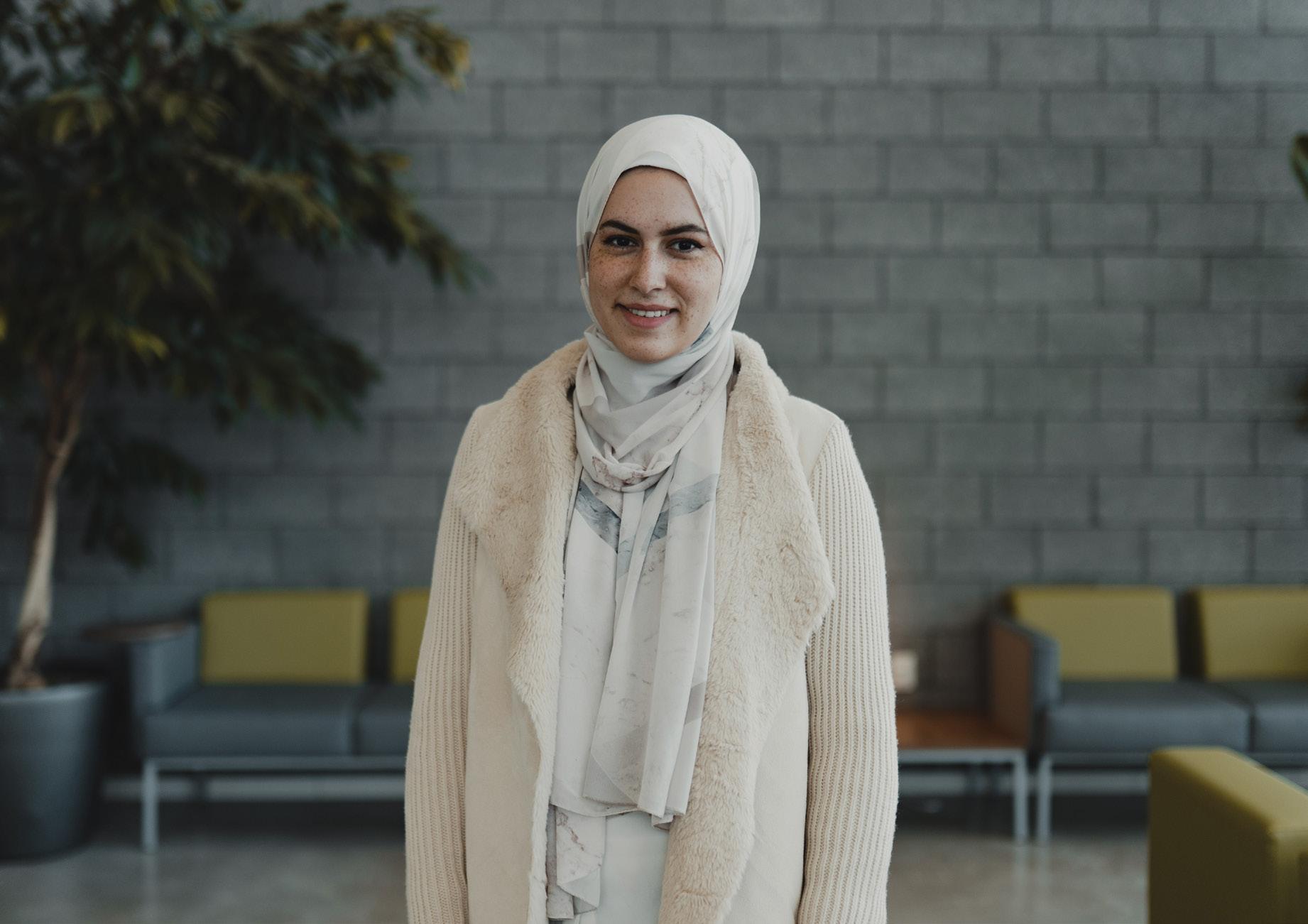
While Jumah has a background in mechatronics, she’s enamoured with her deep dive into the world of software.
She’s currently working on capturing and identifying illegal maneuvers in traffic, such as disallowed turns and improper vehicle takeovers. Capturing vehicle information and transferring it to law enforcement for review, she says, is a more efficient way of protecting people from dangerous choices that drivers make when human enforcement is not around.
Along with her passion, Jumah explains that her teammates help light the fire that energizes her to approach her work each day. She stressed the incredible support and necessity of diverse perspectives coming to the table.
Hanna Haponenko
When Hanna Haponenko pictures a roadway, she envisions fewer cars, more people using public transit and office buildings converted into community spaces. Augmented reality (AR) and virtual reality (VR), she said, are part of the puzzle to getting there.
Haponenko is transitioning to mechanical engineering as a postdoctoral researcher at the McMaster Automotive Resource Centre. She also runs a start-up, Axcessiom, which develops facial gesture recognition technology for drivers with accessibility needs.
With Mobility Cube, she leads discovery and development of VR and AR solutions for the multi-modal traveler.
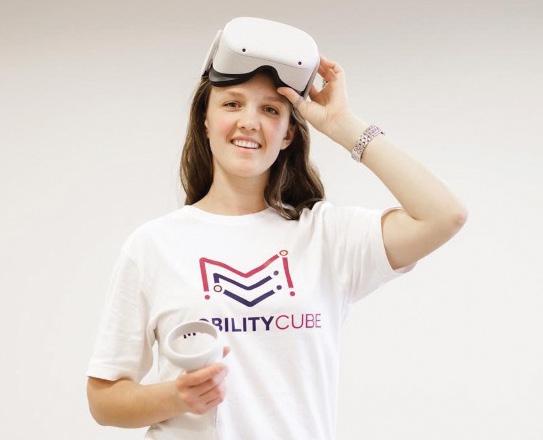
“No more feeling frustrated using your phone and turning back and forth between countless web pages while navigating and exploring a new city. No more feeling exasperated navigating large buildings with multiple accessways, stairs or elevators in crowded environments,” she said.
The overall goal, Haponenko explained, will be to reduce inefficiencies for how travelers navigate the world. She’s exploring ways to design the environment with interactive VR/AR displays, connected devices and personalized travel journeys.
VR-supported remote work, AR-supported ride-sharing combined with public transit to and from the workplace and smart city infrastructure can all make this magnitude of data transmission possible, she said.
Bolstered by this motivation to create change, Haponenko says she’s thrilled to be working alongside strong, intelligent women at Mobility Cube and wants to see more women in leadership positions.
The women on the team, she says, deliver “stunning” work that inspires her own career journey.
“Mobility will be more seamless, human-centred and connected.”
Haponenko was drawn to Mobility Cube not only due to its potential for growth, but also due to its ability to significantly reduce people’s carbon footprint.
“This will take time, but more importantly, it will take more women raising their hands, taking risks and not being afraid to be ambitious.” “As cliché as it sounds, artificial intelligence is the future…there are no doubts anymore,” she said. “We are trying to implement AI in an attempt to make transportation safer, more accessible and more reliable for all of us.”
38 Faculty of Engineering | Annual Report 2022 McMaster Engineering BRIGHTER WORLD 39
Research and Scholarship Highlights
Tohid Didar, Canada Research Chair in Nano-biomaterials and Jeff Weitz, biomedical engineering professor, have created a device to replicate conditions in blood vessels. This device has the impact of revolutionizing blood vessel grafts, which are needed in transplants, bypasses and other surgeries, as a way to route blood around blocked areas, or to replace damaged or leaking blood vessels themselves.
• A project led by Rong Zheng, Canada Research Chair in Mobile Computing, and Ian Bruce, electrical & computer engineering and biomedical engineering professor, in collaboration with researchers at Western University received $250K in federal funding. The research will explore bringing assistive hearing
technology and virtual and augmented reality auditory capabilities to personal devices. The team will research and develop the methodology, hardware and software that will allow people to measure their own hearing capabilities with personal devices – like a cell phone and earbuds – and adjust those devices to compensate for their impairments.
A research team led by Zahra Motamed, mechanical engineering assistant professor, has developed a non-invasive monitoring and diagnostic framework. Doctors say it will help individualize and improve future treatment for patients with cardiovascular disease.
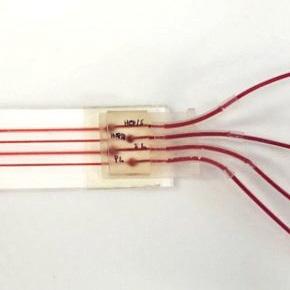
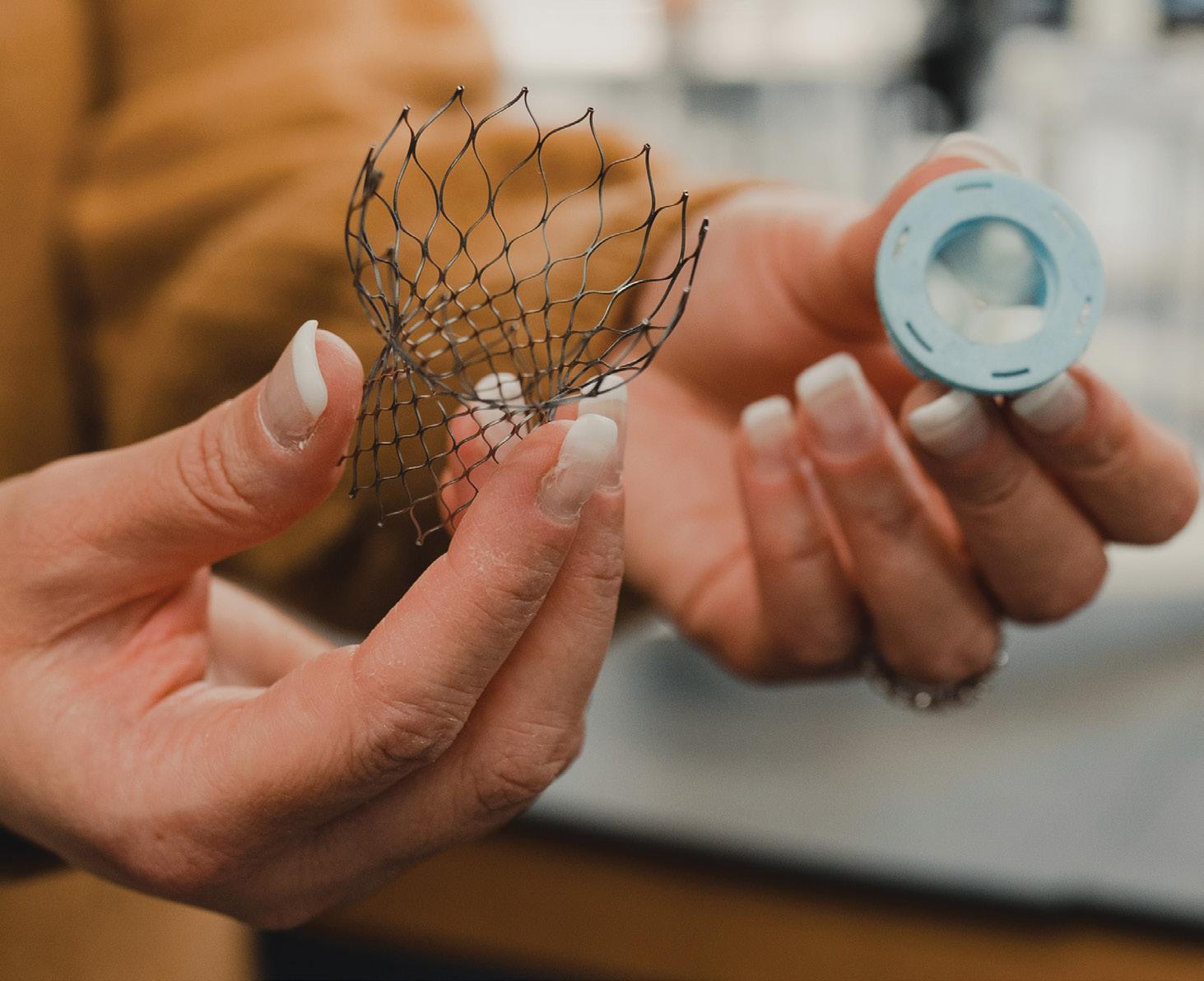
McMaster’s Centre of Excellence in Protective Equipment and Materials (CEPEM) helped Toronto-based start-up AGS Zephyr launch a hyper-localized air purification system.The team led by Chan Ching, mechanical engineering associate chair, and Rakesh Sahu, materials science and engineering adjunct assistant professor, validated the effectiveness of the system.
• TeraGo Inc. has partnered with McMaster University to jointly build and deploy the first university-based 5G millimeter wave private network for research. With an established 5G millimeter wave private network, the two entities plan to develop the most cutting-edge technologies for advanced manufacturing and Industry 4.0 in Canada.
RepelWrap, a self-cleaning plastic wrap developed by Leyla Soleymani, Canada Research Chair in Miniaturized Biomedical Devices, and Tohid Didar, Canada Research Chair in Nano-biomaterials, is pathogen-resistant and protects surfaces from dangerous bacteria as well as viruses. The new wrap, designed to protect against contamination on high-touch surfaces such as door handles and railings, is now moving toward scaled-up production through FendX Technologies, Inc. This is a game-changer for preventing transmission of viruses.
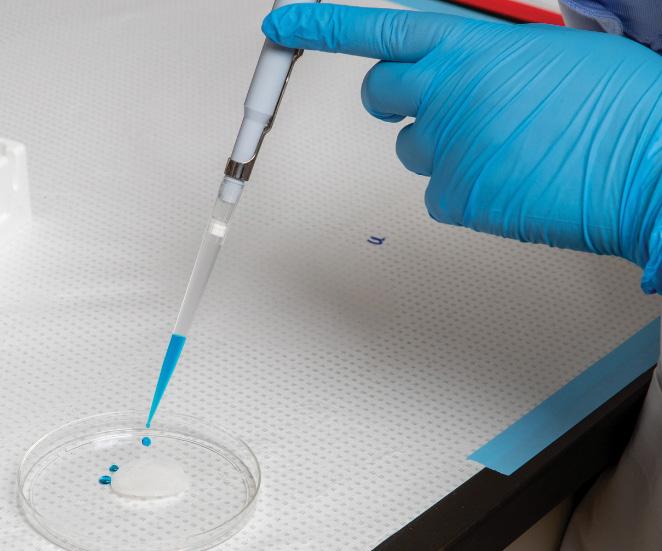
• Verv Technologies and McMaster University announced a new collaboration. Led by Leyla Soleymani, engineering physics professor, the collaboration will develop groundbreaking technology to improve at-home healthcare. A $314,000 investment from the Natural Sciences and Engineering Research Council of Canada will be supporting the development of a series of blood tests that have the potential to impact how individuals are able to manage their own healthcare.
• Enedym is a technology start-up company from McMaster University. It has ownership of over 60 patents and pending patent applications and related inventions developed by the Hybrid Powertrain Laureate, Ali Emadi, and his research group at the McMaster Automotive Resource Centre.
• Andrew Gadsden, mechanical engineering associate professor, and his research team built and programmed a robotic telescope mount instrument subsystem for NASA’s air-LUSI project to measure moonlight.
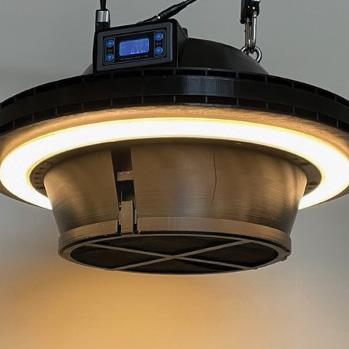
Sumanth Shankar, mechanical engineering professor, and research scientist Xiaochun Zeng developed a high-strength material. The material is at least 35 per cent lighter than a traditional aluminum alloy. Their work was recognized with a prestigious 2022 Altair Enlighten Award.
Moataz Mohamed, civil engineering assistant professor, is developing policy recommendations by identifying how transit systems can be customized to community needs. The Government of Canada has shown its support through the Social Sciences and Humanities Research Council (SSHRC)
Knowledge Synthesis Grant: Mobility and Public Transit category. This project serves as a major step in improving Canada’s transit infrastructure.
McMaster Engineering BRIGHTER WORLD 41
Innovation with Impact
Innovation is at the heart of McMaster Engineering.
McMaster Engineering engaged with more than 110 industry partners globally and developed 39 invention disclosures. We actively foster, nurture and collaborate with local startups and partner with incubators, regional innovation centres and other institutions to give our students and faculty members the opportunities to turn big ideas into realities.
Our faculty has made connections both nationally and internationally with industry leaders in technology, sustainability, climate change and more.
The Forge is a business incubator funded by McMaster University, serving novel start-ups in the Hamilton, Greater Toronto and Niagara Regions. Launched in 2015, they work hands-on with entrepreneurs to develop their business ideas from ideation and validation to growth, and many of them are Mac Eng students and alumni.

38companies actively supported by The Forge, develop products and services in all sectors – Life Sciences; Transportation & Energy, Education & Consumer Goods and Information and Communication Technology
Two Mac Eng Grads Win Arthritis Society Awards
In April 2022, Biomedical and Mechanical Engineering alumna and founder of ImaginAble Solutions, Lianna Genovese ‘22 and Computer Engineering alumnus Matthew Rosato ‘03 and founder of PROVA Innovations, received prestigious awards from the Arthritis Society for their innovations. Out of 21 submissions and 8 finalists, two devices made by members of our Fireball Family were among the winners.
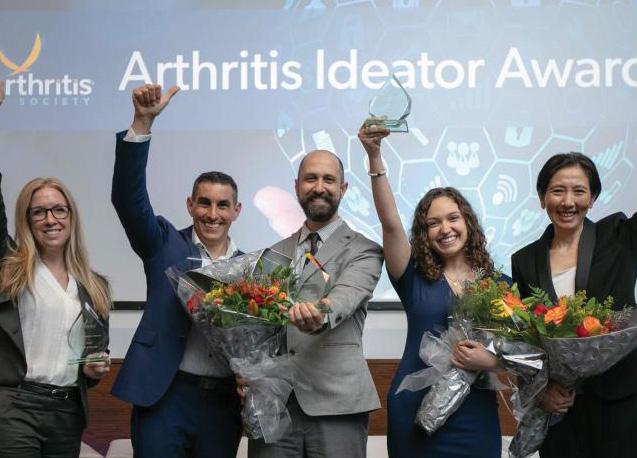
WithinStride by PROVA Innovations received the Arthritis Ideator Award and Guided Hands by ImaginAble Solutions was chosen as the People’s Choice Award winner. They each received a $50,000 grant and access to expert advice from the Arthritis society and people living with arthritis who can assist with beta testing.
Genovese hopes to help patients with limited hand mobility to write, paint, draw and access technology through Guided Hands which began as a first year school project. Rosato designed a ‘smart’ insole that guides movement in patients suffering from osteoarthritis, reducing pressure on hips and knee joints.
Lights. Camera. AXIBO.
Electrical Engineering alumni Anoop Gadhrri and Sohaib Al-Emara, along with BTech alumnus Reiner Schmidt, found themselves searching for a way to make their filming processes easier. When they weren’t able to find what they were looking for on the market, they put their engineering education into action to construct a solution by creating their very own device. Together they invented AXIBO, a state-of-the-art tool that uses Artificial Intelligence to automate several camera functions, leaving monotonous work to the device. AXIBO launched as a start-up through The Forge this year.
AXIBO makes a significant impact on filming projects by increasing the quality of video being captured at a much lower price than it would cost in labour. The device’s ability to learn and adapt its features through several levels of adjustable automation gives it the power to replace an entire film crew.
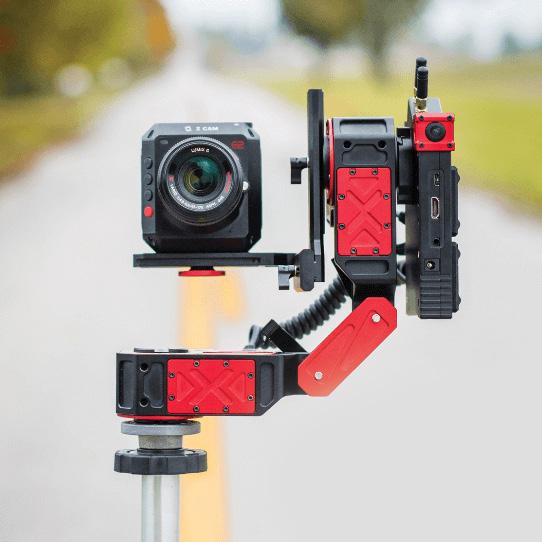
“One company we work with is creating a fully automated pipeline, where they have a stage surrounded by 100 cameras. When an actor comes on the stage, AXIBO’s specialized hardware for AI software can detect, track, and recognize the actor, as well as identify items around the actor. Without AXIBO, having 100 camera operators following an actor’s movements would not be feasible,” said Gadhrri.
Early adopters of AXIBO include Netflix and Apple.
42 Faculty of Engineering | Annual Report 2022 McMaster Engineering BRIGHTER WORLD 43
40% of those active companies are founded by students or alumni from McMaster Engineering 269 companies and entrepreneurs have gone through The Forge since 2015 42M raised and 725+ jobs created A total of $
Engaging Local, National, Indigenous and Global Communities
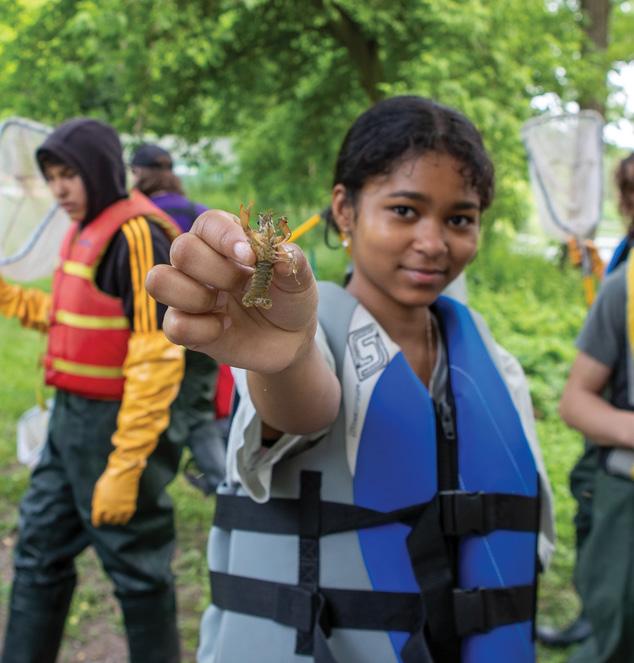
We continue to develop and expand our network of community partners, research collaborators and alumni who share our passion for creating a brighter world.
In 2022, we engaged with
330 Indigenous youth
through relationships with Six Nations Polytechnic, Six Nations Public Library, Six Nations Public Health and other community groups.
44 Faculty of Engineering | Annual Report 2022
A Grand day of STEM activities for Indigenous high school students
Six Nations Polytechnic partners with McMaster University and the University of Waterloo to explore STEM field work in the Grand River.
On June 15, students from Six Nations Polytechnic (SNP) and the STEAM Academy program donned their waders to join researchers Charles de Lannoy, Karen Kidd and Mark Servos to conduct experiments in the Grand River.

In its first year, this joint initiative led by McMaster University and the University of Waterloo, is a land-based experiential learning approach to science and engineering. The event is a pilot for a micro-credential course in which the students could eventually gain a McMaster University credit by the end of high school.
“It’s a very exciting opportunity to see engineering and science in action, and it’s also fun to just go into the river, cool off on a hot day, explore what these two rivers look like, discover what makes them different, and use technologies and an understanding of ecology to evaluate their health,” said de Lannoy, chemical engineering associate professor at McMaster and one of the lead organizers of the initiative.
Before beginning their work, a student laid tobacco in the water.
“We wanted to establish some protocol before conducting our investigations and environmental work,” said Chris Martin, Indigenous Program Facilitator at SNP.
“Placing the tobacco in the river acknowledges where we are and lets creation know what we are about to do. It allows us to bring our minds together before the event.”
Throughout the day, students cycled through three activities: water quality monitoring and sensors, bug collection and identification and electrofishing.
De Lannoy focuses on developing technologies that can continuously monitor the health of the river remotely and make those technologies robust, adaptable and cheaper.
Students were able to use these sensors to test the oxygen in various parts of the river to determine its health. One student remarked how the sensors were like little tentacles. De Lannoy was thrilled with the curiosity of the students, how they asked great questions and devised creative hypotheses.
Kidd, de Lannoy and Servos are part of a research program funded by Global Water Futures called “Co-Creation of Indigenous Water Quality Tools,” led by Dawn Martin-Hill at McMaster.
McMaster Engineering BRIGHTER WORLD 47
“What we’re showcasing is that engineers and scientists can engage with First Nations Youth and they can have really meaningful experiences,” said de Lannoy. “We can really serve this community and I encourage other professors to do more activities like this.”
Engaging Local, National, Indigenous and Global Communities Highlights


Mac Eng celebrates our alumni community

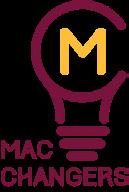
McMaster Engineering commemorates 2020 and 2021 graduates in Legacy Celebration. The event hosted more than 600 attendees in a ceremony and reception to celebrate the incredible achievements of the students who completed their studies during the COVID-19 pandemic, giving them the opportunity to finally walk across the stage.
A celebration of eight reunion
classes
Over 50 graduates came together on campus on September 17 to celebrate their milestone reunions; 20 of which celebrated 50 years from classes ‘70, ‘71, and ‘72. The event brought together alumni of all ages for a fun day of reminiscing on their time as students and catching-up with their extended Fireball Family.
This included Bruce Watson and Marlene Lenarduzzi whose daughter is in her second-year of the iBioMed program.

124 students
Cosmos Voutsinos, Mechanical Engineering alumnus, 1976, and his wife Donna, have included a gift in their wills to establish a scholarship in support of Mechanical Engineering graduate students who demonstrate academic and research excellence.


Throughout his career in the nuclear engineering industry, Cosmos carried an appreciation for the growth of knowledge and understanding that his McMaster professors fostered. Donna worked as a research assistant in Biochemistry from 1972 to 1975 under Dr. McCalla who was Dean of Science at that time. This gift is both an expression of their thanks for the past and encouragement for the future.
Interested in making a life-changing contribution?
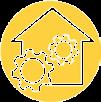
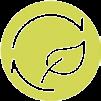
Learn more about how you can donate at eng.mcmaster.ca/giving.

48 Faculty of Engineering | Annual Report 2022 McMaster Engineering BRIGHTER WORLD 49
1,415 new alumni 25,100 active alumni
enrolled in MacChangers: a co-curricular initiative which brings students together to tackle problems facing our local community and flex their problem-solving skills in areas such as: clean and green; supporting local businesses; arts and culture; infrastructure and built environment; and healthy and safe cities.
Vincent Suffoletto and Glenn McGinnis class of 1970
Teaming up with community partners to teach toddlers STEM fundamentals

For the first time in Canada, McMaster Engineering’s Community Outreach is working to amplify developing the fundamentals of STEM learning experiences for children and for their caregivers through a variety of programs that include facilitated story time and plays, take-home STEM kits and professional development for front line staff. Partners include Hamilton Public Library, Grimsby Public Library, Hamilton Area EarlyONs, Six Nations Public Library and YWCA child care centres. This exciting, cutting-edge work harnesses the power of community collaboration to support children and families where they live and to spread the message that engineering is for everyone.
Global Engineering Design Studio (GEDS) program
This year, McMaster, along with McGill University, Monash University, University of Auckland, University of Southern California, University of Toronto, and University College London, have partnered to deliver the Global Engineering Design Studio (GEDS) program. The GEDS brings together engineering students from different parts of the world to work on some of our global society’s highest priority challenges. There were 70 students registered this year, 15 from McMaster.
Global Collaborations
• Andrea Hemmerich, W Booth School sessional faculty member, is supporting a new collaboration between Academics Without Borders and Meru University of Science and Technology. She has been working to equip the Kenyan population with more professionals in cancer care.

• Sarah Dickson-Anderson, civil engineering professor, participated in field work in Ghana as part of a collaboration between McMaster University, University of Saskatchewan, University of Ghana and Ugandan Christian University to investigate the gendered impacts of water accessibility in rural sub-Saharan African communities in the context of climate change.
• David Novog, engineering physics professor and NSERC Industrial Research Chair, hosted Christian Reiter, professor, at the Technical University of Munich (TUM). With two of the largest university-based nuclear reactors in the world, TUM and McMaster aim to collaborate to support Small Modular Reactor deployment projects, improve methods used to license nuclear reactors in small communities and co-develop new solutions to improve the sustainability of nuclear energy.
• Mike Noseworthy, electrical & computer engineering professor, is collaborating with Swiss clinicians and scientists. He is working with members at the Swiss Concussion Centre, Felix Platter Spittal and Swiss Neuro Radiosurgery Center to better treat patients with brain injuries. Noseworthy’s partnerships are showing promise in early-stage Alzheimer’s disease, long COVID and Hantavirus infection.
• Jim Cotton, mechanical engineering professor, spent the summer as a visiting professor at the Institute of Fluid Science, Tohoku University, Sendai, Japan He explored the applicability of their cutting-edge high-speed velocimetry measurement systems for his advanced thermal energy storage system. He is also planning graduate student exchanges for 2023 and establishing this new experimental testing capacity at McMaster to aid in the Faculty’s strategic research program on low carbon economy pathways.
50 Faculty of Engineering | Annual Report 2022 McMaster Engineering BRIGHTER WORLD 51
Leadership, Awards & Appointments
Provost Susan Tighe won the Sandford Fleming Award at the Canadian Society for Civil Engineering (CSCE) 2022 Annual Conference in Whistler, B.C.

Dean Heather Sheardown, Chemical Engineering and Biomedical Engineering Associate Professor Zeinab Hosseinidoust and Materials Science and Engineering Distinguished Professor Igor Zhitomirsky named Canada Research Chairs.
Alumni Chris Schankula and Mitchell Cooke received the 2022 Governor General Academic Medals.
McMaster Engineering-affiliated professionals, including professors and alumni, have been elected to the Canadian Academy of Engineering in recognition of their outstanding contributions to their fields:

Engineering Physics Professor Leyla Soleymani named to Royal Society of Canada’s College of New Scholars, Artists and Scientists.

Electrical & Computer Engineering Distinguished Professor Jamal Deen recognized for important contributions to the field of computer engineering and science with the prestigious Gottleib medal from the IEEE. Deen was also the recipient of the Lifetime Achievement Award from MSU and the President’s Award for Excellence in Graduate Supervision.
iBioMed alumna Lianna Genovese, researcher Zobia Jawed and Biomedical and Mechanical Engineering alumna Navita Dyal honoured as recipients of the YWCA Hamilton Women of Distinction Awards.
Professor Emeritus and former Dean John Bandler received the 2023 Institute of Electrical and Electronics Engineers (IEEE) Electromagnetics Award for contributions to electromagnetic optimization and the modeling of high-frequency structures, circuits and devices.

Electrical & Computer Engineering Professor Mehdi Narimani named a 2022 University Scholar, an award that recognizes the achievements of mid-career researchers who are considered global leaders in a number of diverse research areas and academic disciplines.
Integrated Biomedical Engineering & Health Sciences Assistant Professor Anna Korol received the Excellence in Teaching Award at the McMaster Students Union (MSU) Teaching Awards.

McMaster Engineering’s Venture Academy was awarded with the Actua Experience Award and were recognized, in particular, for their achievements within the National Girls program.
Nobel laureate and McMaster alumna Donna Strickland was honoured with a street naming ceremony that took place during this year’s Nobel Week.
Josh Lawrence was this year’s recipient of the President’s Award of Excellence in Student Leadership for his commitment to serving and supporting engineering students as a peer tutor, volunteer, teaching assistant and through various leadership roles.
Brian Baetz
Director, W Booth School of Engineering Practice and Technology
Gail Krantzberg
Professor, Masters of Engineering and Public Policy Program, W Booth School of Engineering Practice and Technology
John Preston
Associate Dean, Research, Innovation and External Relations
Babak Nahid-Mobarakeh, electrical and computer engineering professor, has been named a Fellow of the Institute of Electrical and Electronics Engineers (IEEE) in recognition of his contributions to service continuity of electric motor drive systems.

Omar Danta was honoured with The Veronika Czerneda Staff Award for Outstanding Service. Omar has been a loyal employee of the Faculty of Engineering for more than 13 years and worked extensively with the many technology labs in the W Booth School.
Lynnette Madsen
Visiting Professor, Materials Science and Engineering, Cornell University
‘94 Materials Science and Engineering
Moncef Nehdi
Professor and Chair, Department of Civil Engineering
Michelle George
Vice President, New Energy Technologies, Enbridge Inc.
‘95 Civil Engineering and Management
52 Faculty of Engineering | Annual Report 2022 McMaster Engineering BRIGHTER WORLD 53
Six
Academic Leadership Appointments
McMaster Engineering’s 2022 Schulich Leaders
Launched in 2012, Schulich Leader Scholarships provides up to 100 undergraduate scholarships each year, across top Canadian universities. Schulich Leaders are entrepreneurial-minded students looking to pursue careers in technology, engineering, entrepreneurship and business enterprise and applied scientific research. This year we had five students from Engineering represented:
Sarah Dickson-Anderson
Acting Associate Dean, Academic Tom Doyle Engineering Leadership Fellow
Moncef Nehdi
Chair, Department of Civil Engineering
Denise Geiskkovitch
Barber-Gennum Endowed Chair in Information Technology
Mohamed Bakr
Chair, Department of Electrical and Computer Engineering
Colin McDonald
Acting Co-Director (Engineering), Integrated Biomedical Engineering and Health Sciences (iBioMed/IBEHS) program
Vince Leung
Acting Associate Director (Undergraduate), Integrated Biomedical Engineering and Health Sciences (iBioMed/IBEHS) program
Michael Tait
Joe Ng-JNE Consulting Endowed Chair in Design, Construction & Management of Infrastructure Renewal
Camille Gillespie
Camille Gillespie intends on using their studies to make a difference in the global environment as a chemical engineer, with a focus on reducing levels of carbon dioxide in the atmosphere.


Stephen Veldhuis
Director, McMaster Manufacturing Research Institute
Andrew Gadsden
Engineering Leadership Fellow
Mehdi Narimani University Scholar
Javayria Mudassar
As an aspiring astronaut, Javayria Mudassar says she intends to inspire other women, and in particular Muslim women, to pursue careers in STEM fields

Rebecca Barbera
Rebecca Barbera wants to one day lead a team of engineers focused on nuclear thermal propulsion in high-speed space travel and she is passionate about being a role model for young girls in STEM.

Michelle Adams
As a high school student, Michelle Adams spent many hours working with their community’s robotics team and has launched a community robotics event for kids to inspire the future generation of STEM students.
Tyler Smith
Tyler Smith intends to use the teamwork skills they developed as a competitive curler to work with colleagues across all disciplines to develop additive manufacturing technologies that can be brought into mainstream use.
Writers: Christine Rankin, Meggie MacDougall, Kim Arnott. Designers: McKim.Sherpa. Data Analyst: Kevin Fitzgerald. Photographers: Dan Kim, Geoff Shaw, Georgia Kirkos. Editors: Naz Kittani, Ciara McCann

54 Faculty of Engineering | Annual Report 2022 McMaster Engineering BRIGHTER WORLD 55


McMaster University Faculty of Engineering 1280 Main St West, Hamilton, ON L8S 4L7 905 525 9140 x 24288 | engfac@mcmaster.ca | eng.mcmaster.ca













































































